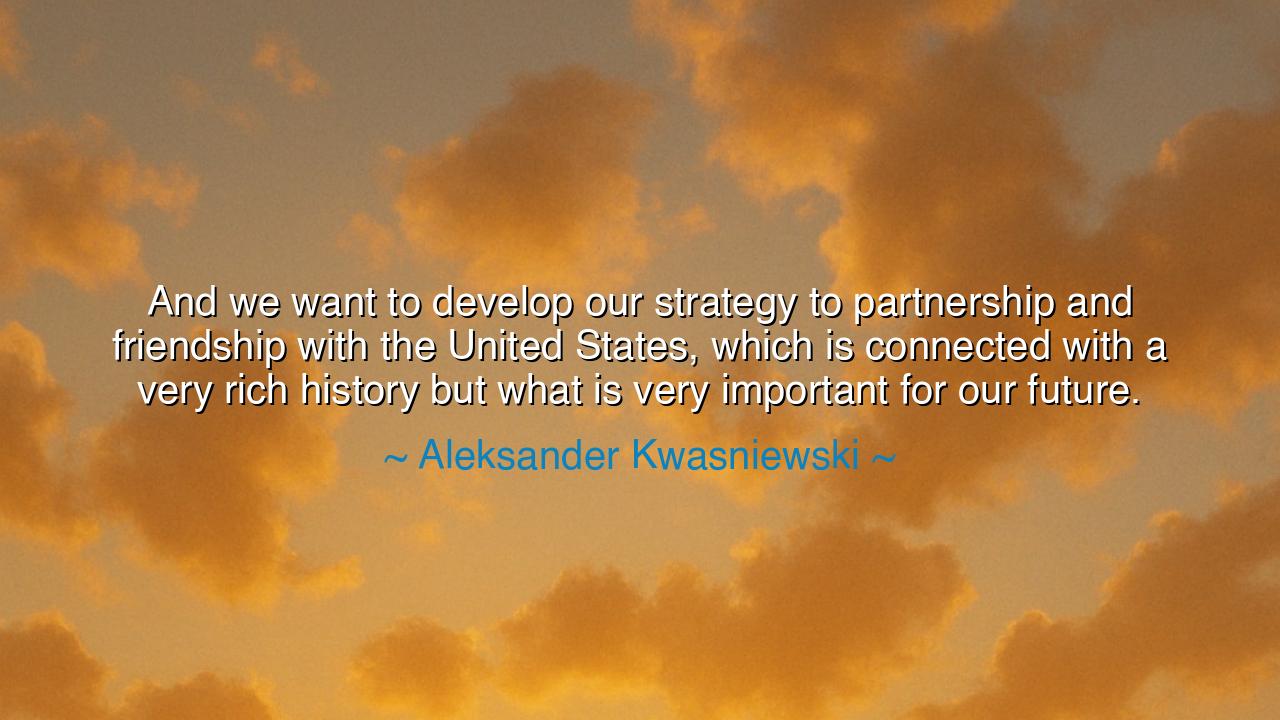
And we want to develop our strategy to partnership and friendship
And we want to develop our strategy to partnership and friendship with the United States, which is connected with a very rich history but what is very important for our future.






“And we want to develop our strategy to partnership and friendship with the United States, which is connected with a very rich history but what is very important for our future.” — in these solemn and forward-looking words, Aleksander Kwaśniewski, the former President of Poland, speaks not merely as a statesman, but as a guardian of memory and a craftsman of destiny. His statement, though political in tone, resonates with the timeless wisdom of nations and individuals alike: that friendship and partnership are not built upon fleeting interests, but upon shared history and shared hope. Beneath his words lies a profound truth — that to shape the future, one must honor the past, and that alliances rooted in respect and mutual trust are the foundation upon which peace and progress are built.
To understand the depth of Kwaśniewski’s reflection, one must look to the history between Poland and the United States — a bond forged in the fires of struggle, freedom, and shared ideals. From the days of Tadeusz Kościuszko and Casimir Pulaski, Polish heroes who fought beside the American revolutionaries, there has existed a thread of mutual respect between these two lands. These men, born under foreign oppression, crossed oceans to fight for liberty — and in doing so, sowed the first seeds of friendship between nations. Kwaśniewski’s words echo that ancient gratitude and renew it for a modern world, where the battle is no longer fought with swords, but with diplomacy, cooperation, and vision.
He speaks, too, from the heart of Poland’s own history — a nation long divided, invaded, and reborn through resilience. The “rich history” he mentions is not merely a phrase of ceremony, but the lived truth of generations who saw their homeland erased from maps, only to rise again through courage and unity. When Kwaśniewski speaks of a “strategy of partnership,” he invokes that history as a guide. For Poland learned, through centuries of isolation and foreign domination, that strength is found not in solitude, but in alliance — not in the pride of standing alone, but in the wisdom of standing together.
In this, Kwaśniewski’s thought carries the spirit of the ancients — for nations, like people, are bound by the same moral laws. Just as no man can thrive without friendship, no country can prosper without partnership. The philosopher Aristotle once said that friendship is composed of “one soul dwelling in two bodies,” and this truth extends to the relations of peoples as well. When nations become friends, their destinies intertwine; their fortunes rise and fall together. A strategic partnership, when guided by friendship and not domination, becomes a covenant — a sacred bond of mutual uplift.
Consider the historical alliance between the United States and France during the American Revolution. Born of shared ideals rather than convenience, that partnership changed the course of history. France’s support — its ships, its soldiers, its belief in liberty — helped secure America’s independence. And though the nations would later face conflicts and distance, the spirit of that alliance endured. Kwaśniewski’s words carry the same aspiration: that Poland and America, two nations born of struggle for freedom, might build a bond that transcends mere politics and becomes a friendship of purpose — a force for peace and human dignity.
What Kwaśniewski reminds us of, beyond the borders of Poland and America, is the eternal truth that partnership and friendship are the engines of civilization. Nations that learn to cooperate, to share wisdom and strength, to lift one another rather than compete in pride — these are the nations that leave a legacy of peace. His words, spoken after Poland’s rebirth from communist rule and its embrace of democracy, were not only diplomatic; they were visionary. He understood that the future of his country — and of all countries — would depend upon how well humanity learns to collaborate, to build bridges where once there were walls.
Thus, from his reflection arises a lesson for all generations: whether in the affairs of nations or of individuals, friendship must be cultivated like a garden. It is not born of convenience, but of care; not of conquest, but of cooperation. To “develop a strategy of partnership” is to dedicate oneself to the long labor of understanding — to listen, to respect, to give and to receive. In life, as in diplomacy, the wisest path forward is not isolation, but alliance.
And so, dear listener, take from Kwaśniewski’s words this enduring teaching: honor the past, but build the future with friendship. Whether you are a leader of men or a simple soul among friends, remember that all strength grows from connection. In every relationship — between people, between nations — strive to be the builder of trust, the keeper of peace, the hand extended in goodwill. For friendship, born of shared history and sustained by mutual hope, is the only force strong enough to shape a better world — for today, and for all the days to come.






AAdministratorAdministrator
Welcome, honored guests. Please leave a comment, we will respond soon